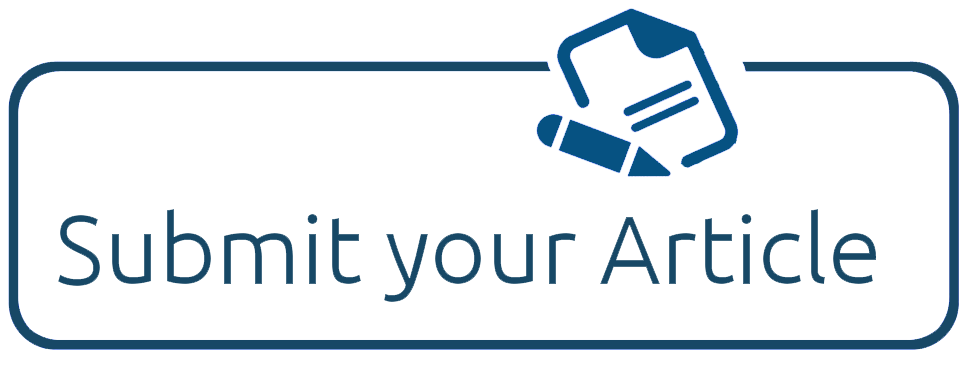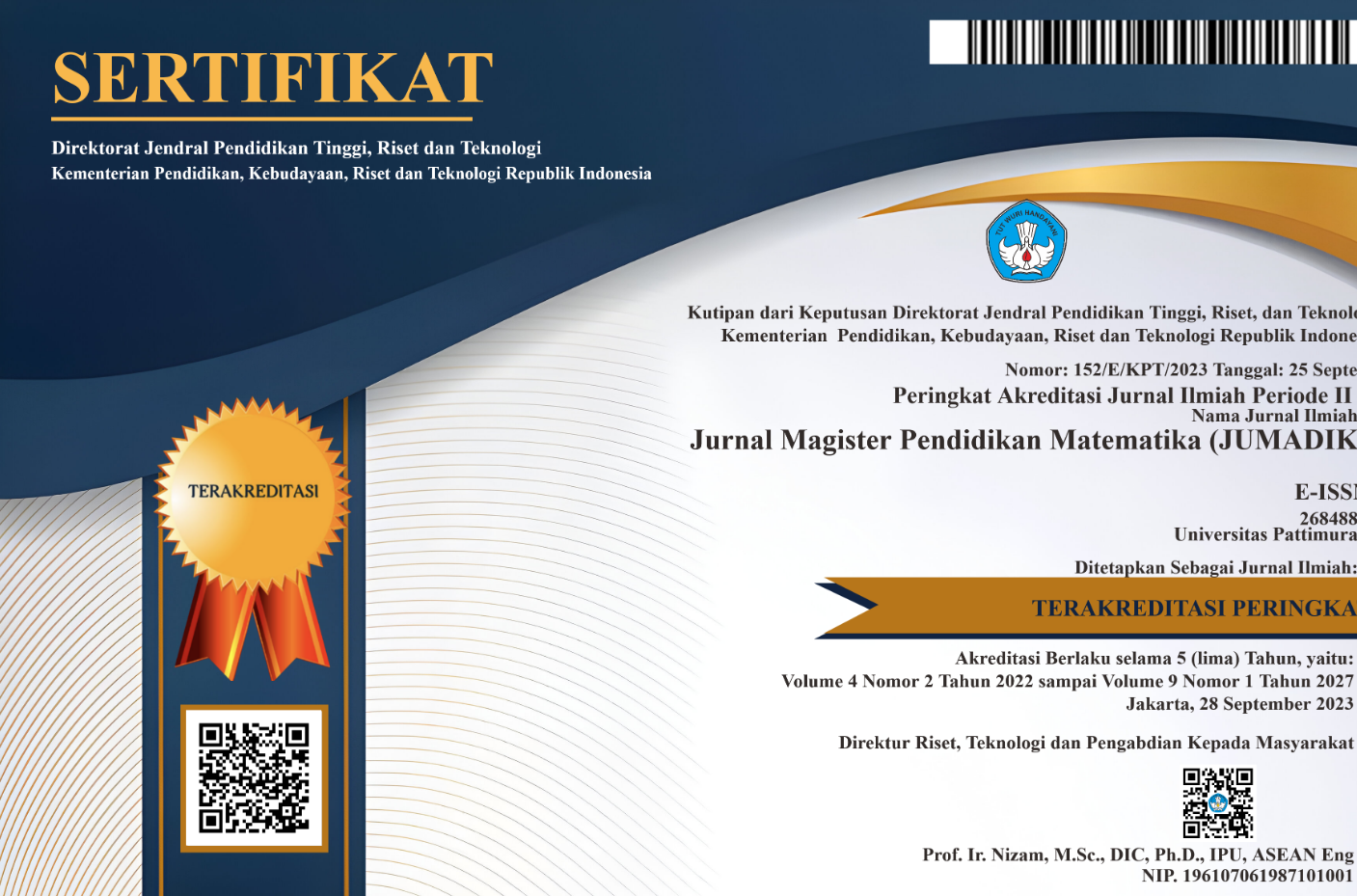GEOMETRI DAN PERMASALAHAN DALAM PEMBELAJARANNYA (SUATU PENELITIAN META ANALISIS)
Abstract
Geometry teaches us not only about how to give appreciation for something, but also how to find connections that occur between geometry material and other lecture material. In addition, geometry also trains communication through exploration, discussion, conjecture and investigation. The problems that exist in basic geometry skills in a row are problems related to logic skills, drawing skills, visual skills, verbal skills, and applied skills. Based on geometric learning using analytical presentation, the problem of using axiomatic deductive is at the top, then the problem of perception. Misconceptions about visual processes and activities, and finally problems with the use of procedures, concepts, and principles
Downloads
References
Daftar Pustaka
Budiarto, Mega Teguh, 1997, Profil Kemampuan Geometri Mahasiswa Baru FMIPA IKIP, FKIP Universitas, dan STKIP Negeri dan Swasta Di Jawa Timur, Pusat Penelitian IKIP Surabaya
Budiarto, Mega Teguh, 1998, Analisis Kesulitan Materi Geometri guru-guru SMP dan SMU di Surabaya, Pusat Penelitian IKIP Surabaya
Budiarto, Mega Teguh, 1999, Pengembangan, Implementasi dan Evaluasi Model Pembelajaran Geometri yang Berpandu pada pendekatan konstruktivisme dengan Memperhatikan Miskonsepsi dan Aras Berpikir Van Hielle di SLTP, Pusat Penelitian IKIP Surabaya
Budiarto, Mega Teguh, 2000, Kemampuan Deduktif Aksiomatik Mahasiswa Jurusan Pendidikan Matematika FMIPA IKIP Surabaya, Penelitian Peningkatan Kualitas Pembelajaran RI.I BATCH II, Proyek PGSM, Pusat Penelitian IKIP Surabaya
Budiarto, Mega Teguh, 2008, Membangun Level Abstraksi Siswa SMP dalam Memahami konsep Geometeri, Penelitian Fundamental Tahun Pertama, Pusat Penelitian Unesa Surabaya.
Budiarto, Mega Teguh, 2009, Membangun Level Abstraksi Siswa SMP dalam Memahami Konsep Geometeri, Penelitian Fundamental Tahun Kedua, Pusat Penelitian Unesa Surabaya.
Budiarto, Mega Teguh, 2010, Profil Pemetaan Level Abstraksi Siswa yang Mempunyai Gaya Belajar Visual Spatial dan Auditory sequensial denan Operasi Logis Piaget, Penelitian Fundamental, Pusat Penelitian Unesa Surabaya.
Budiarto, Mega Teguh, 2011, Rigorous Mathematical Thinking Dalam Pembelajaran geometri, Penelitian Unggulan Perguruan Tinggi, Pusat Penelitian Unesa Surabaya.
Hershkowitz, R; Schwarz, B.B.; Dreyfus, T. (2001). “Abstraction in Context: Epistemic Actionsâ€. Journal for Research in Mathematics Education. Vol 32 No. 2 March 2001.
Jirotkova, D., Littler, G.H., Classification Leading to Structure, http://cerme4.crm.es/Papers520definitus/3/JirotkovaLittler.pdf
Kinard, J. T., & Kozulin, A. 2008. Rigorous Mathematical Thinking : Conceptual Formation in the Mathematics Classroom. New York : Cambridge University Press.
Kinard, J. T., & Kozulin, A.1998. Psychological Tools : A Sociocultural Approach to education. London : Harvard University Press.
Kinard, J. T., & Kozulin, A. 2001.Creating Rigorous Mathemaical Thinking: A Dynamic that Drives Mathematical and Science Concptual Development. Retrieved on October 21, 2009 from www.umanitoba.ca/unevoc/conference/ papers/ kinard .pdf
Kinard, J.T. Rigorous Mathematical Thinking, Retrieved on January 23, 2010 from http://rmtchicago.com
Kinard, J.T. 2007. Method and Apparatus for Creating Rigorous Mathemaical Thinking. Retrieved on 24 March 2010 from http://www.freepatentsonline. com/y2007/0111172.html
Kozulin, A. 2002. Sociocultural Theory and the Mediated learning Experience. School Psychology International, Vol. 23(1): 7-35.
Kozulin, A. 2005. Rigorous Mathematical Thinking: Mediated Learning and Psychological Tools. Focus on learning Problem in Mathematics 27.3 (Summer, 2005) :1(29). Academic OneFile. Gale. Universitas Negeri Surabaya. Retrieved on 20 Oct. 2009 from http://find.galegroup.com/gtx/start.do?prodId=AONE.
/kommit2004_psikologi_012_362.pdf. download pada 18 November 2010
Kozulin, A., & Presseisen, B.Z. 1995. Mediated Learning Experience and Psychological Tools: Vygotsky’s and Feuerstein’s Perspectives in a Study of Student Learning. Educational Psychological, 30, 67-75.
Kozulin, A., Gindis, B., Ageyev, V.S., & Miller, S.M. 2003. Vygotsky’s Educational Theory in Cultural Context. New York: Cambrige University Press.
Rosa, M.; & Orey, D. C. (2010). Ethnomodeling: A Pedagogical Action for Uncovering Ethnomathematical Practices. Journal of Mathematical Modelling and Application, 1(3), 58-67, 2010.
Tsamir P, & Dreyfus, T. 2002. “Comparing Infinite Sets – A Process Of Abstraction. The case of Benâ€. The Journal of Mathematical Behavior. Vol 21 Issue 1. p:1-23
Copyright (c) 2019 JUMADIKA : Jurnal Magister Pendidikan Matematika

This work is licensed under a Creative Commons Attribution-NonCommercial-ShareAlike 4.0 International License.
License and Copyright Agreement
In submitting the manuscript to the journal, the authors certify that:
- They are authorized by their co-authors to enter into these arrangements.
- The work described has not been formally published before, except in the form of an abstract or as part of a published lecture, review, thesis, or overlay journal. Please also carefully read Jurnal Magister Pendidikan Matematika (JUMADIKA) Posting Your Article Policy.
- That it is not under consideration for publication elsewhere,
- That its publication has been approved by all the author(s) and by the responsible authorities – tacitly or explicitly – of the institutes where the work has been carried out.
- They secure the right to reproduce any material that has already been published or copyrighted elsewhere.
- They agree to the following license and copyright agreement.
Copyright
Authors who publish with Jurnal Magister Pendidikan Matematika (JUMADIKA) agree to the following terms:
- Authors retain copyright and grant the journal right of first publication with the work simultaneously licensed under a Creative Commons Attribution-NonCommercial-ShareAlike 4.0 International License (http://creativecommons.org/licenses/by-nc-sa/4.0/) that allows others to share the work with an acknowledgment of the work's authorship and initial publication in this journal.
- Authors are able to enter into separate, additional contractual arrangements for the non-exclusive distribution of the journal's published version of the work (e.g., post it to an institutional repository or publish it in a book), with an acknowledgment of its initial publication in this journal.
- Authors are permitted and encouraged to post their work online (e.g., in institutional repositories or on their website) prior to and during the submission process, as it can lead to productive exchanges, as well as earlier and greater citation of published work.








